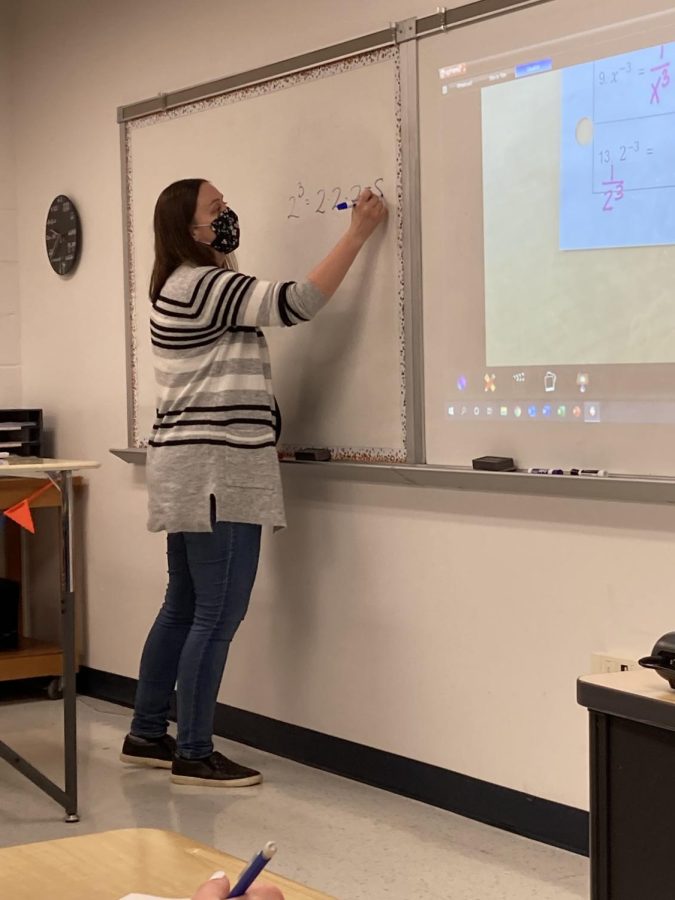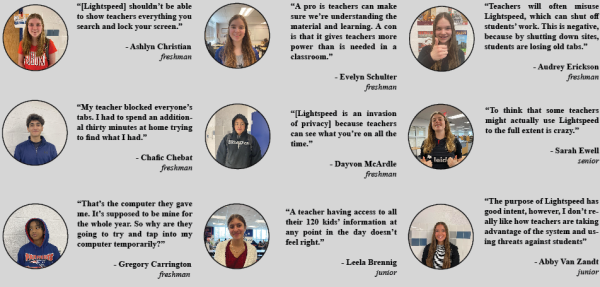A rush of rapid mathematics
Photo courtesy of Allie Kugler
Teacher Erin Pawlowicz teaches a class of Algebra 1 students how to multiply exponents. Combined with the effects of virtual learning, an accelerated curriculum compared to last year, and the nature of math as a subject, this year has been difficult for many students.
FCPS adjusted their math curriculum before the start of this school year, returning to the set of standards in place before the pandemic. And both teachers and students alike are beginning to voice their frustrations with the seemingly-accelerated pacing.
“In Algebra 1 and Geometry, the math curriculum was adjusted by the county last year because of COVID-19, with standards being reduced for the 2020-2021 school year,” said teacher Charlotte Matzal. “This year, we are returning to the ‘normal’ curriculum; the standards being covered this year are the same as what was covered before COVID-19. However, teachers have been given freedom this year to de-emphasize some of these standards to adjust to student needs after the year of virtual learning.”
After a full year of virtual/hybrid learning, it’s a given that some students are lagging behind in their classes, which is especially damaging because most math concepts build off each other. For example, a freshman’s ability to learn and succeed in World History has pretty much nothing to do with how well they did last year in their eighth-grade Civics classes because those two courses are entirely different. Math doesn’t work the same way, and for some students, numbers aren’t as easily understandable as other subjects.
“I’m currently in Algebra 2 HN,” said sophomore Daniel Vtipil. “I’ve felt the class is moving very fast sometimes and [that] rushes my availability to comprehend the subject. In person, sometimes I fail to grasp the concepts and struggle on the quiz [we] have the next day. Sometimes the pacing is too fast for me, sometimes it’s just fine.”
While it’s easy to sympathize with students having a difficult time this year, it’s also hard to blame the county for its efforts. Trying to push for academic rigor, particularly since class pacings were not technically accelerated and no new concepts were added, doesn’t seem like a terrible move. And yet, the outcome of their decision also seems hard to justify, especially given just how much this change also affects teachers.
“I think it has been [an] adjustment for both students and teachers as we learn what can be expected this year and how best to fill in any gaps that were left from last year,” said teacher Erin Pawlowicz. “Many students did not have a strong understanding of prior knowledge from the previous year and it has been an adjustment for teachers to figure out how to fill those gaps, while also not jeopardizing the integrity and rigor of the course.”
Determining whether the county made the correct decision in reinstating the previous math standards is difficult to assess. Although many students were not prepared for the course pacing, if this change was not made now, it would be difficult to ever bring students back to previous standards of learning. In what appears to be a lose-lose situation, the county chose to push towards a pre-pandemic academic world, and both students and teachers are now feeling the effects of that decision. For better or worse, it seems the old normal is the new normal.






